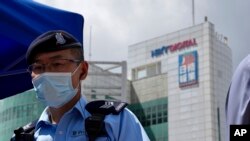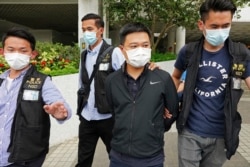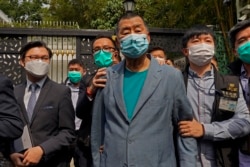Following a recent raid by security officials, the arrest of senior staff and an asset freeze, Hong Kong’s pro-democracy newspaper Apple Daily announced on Monday, June 21, that its closure is imminent.
After months of pressure, the hammer fell on June 17, when 500 police swarmed Apple Daily’s office, arresting five executives and seizing $2.3 million in Apple's assets, leaving the paper unable to pay its staff.
On Wednesday, June 23, a columnist for the paper was also arrested, “on suspicion of conspiring to collude with a foreign country,” Reuters reported.
Ryan Law, the chief editor of Apple Daily; Cheung Kim-hung, the CEO of Next Digital, Apple Daily’s parent company; and three companies related to Apple Daily are being prosecuted for breaching Hong Kong’s National Security Law (NSL).
According to Reuters, Law and Cheung were charged with "collusion with a foreign country or with external elements to endanger national security” and denied bail on grounds they are likely to reoffend. Two Apple Daily senior editors and another executive detained June 17 have yet to be charged and were released.
Apple Daily was founded by media tycoon and pro-democracy activist Jimmy Lai, who is currently imprisoned for his role in unauthorized demonstrations. Lai is also the first high-profile person charged under the security law.
Lai was accused of calling on a foreign country or institution to “impose sanctions on blockade, or engage in other hostile activities” against China or Hong Kong, National Public Radio reports, citing the Apple Daily.
After widespread criticism of the Apple Daily arrests, Hong Kong’s chief executive Carrie Lam dismissed allegations the executives were arrested for their journalistic work, stressing the government’s desire to implement the national security law.
“What we are talking about is not exchanging views between foreigners and journalists. It is violating the law as defined in the national security law and based on very clear evidence which will bring the case to court,” China’s state-run CGTN cited Lam as saying.
“Don't try to underplay the significance of breaching the national security law, and don't try to beautify these acts of endangering national security, which the foreign governments have taken so much to their heart.”
That is misleading. As rights monitors have noted, the vague nature of the NSL makes it possible to criminalize numerous forms of free speech and journalistic activity under the pretext of national security.
Prior to passage of the law last year, Hong Kong had a free press. Even China’s “One Country, Two Systems” principle provided for freedom “of speech, of the press, of assembly, of association, of travel, of movement, of correspondence, of strike, of choice of occupation, of academic research and of religious belief.”
Unhappiness with China’s encroachment on Hong Kong’s relative independence culminated in the 2019-2020 protest movement, which at its height drew an estimated quarter of the city's 7.5 million people to the streets.
Those protests were sparked by a since-tabled extradition bill that would have allowed for Hong Kongers to be sent to mainland China to face trial. The protests sparked a harsh reaction from Beijing, which has severely limited the judicial, legislative and civic autonomy that Hong Kong previously enjoyed under the joint declaration.
The NSL was one such measure. Passed on June 30, 2020, the NSL criminalizes four categories of activities — secession, subversion of state power, terrorism and collusion with foreign entities. The law also gives authorities in Hong Kong and Beijing far-reaching power to control the internet, media outlets, schools and other civil organizations.
The independent online news outlet Hong Kong Free Press said the NSL’s “catch-all wording” gives the government power to criminalize political views, including “advocating for independence, autonomy or international sanctions.”
The U.K. rights group Amnesty International likewise found the NSL “is dangerously vague and broad,” as “virtually anything could be deemed a threat” under the law. Beijing maintains the law applies even to nonresident Hong Kongers, or “anyone on the planet,” Amnesty said.
A recent Georgetown Center for Asian Law report said the “vast majority” of the 105 people arrested under the law from July 1, 2020, to January 14, 2021, “would not be considered national security cases in other liberal constitutional jurisdictions.”
The Georgetown report said this has created a “climate of fear,” with self-censorship undermining the “core basic political rights of free expression, free assembly, and free association,” which are being “heavily restricted” in ways not seen prior to the law’s enactment.
The law’s “core provisions are vague,” making it difficult to predict what can and cannot be said, the report concluded.
The situation has forced journalists to engage in self-censorship for fear that publications will be held criminally liable for what they print. That is apparent in the Apple Daily case, as well as the censoring of articles that merely reported on the potential effects of Western sanctions on Hong Kong and Chinese government officials.
Such articles could potentially “run afoul of the NSL,” the Georgetown report noted.
New York-based Human Rights Watch (HRW) called the security law “Beijing’s most aggressive assault on Hong Kong people’s freedoms since the transfer of sovereignty in 1997.”
It noted that Hong Kongers now faced imprisonment for possessing or displaying banners, flags or other printed materials that promote Hong Kong’s independence.
Chanting similar slogans is also now forbidden. HRW reported that a man was charged with “inciting subversion” and “terrorism” after he collided with a group of officers on his motorcycle while carrying a banner that read “Liberate Hong Kong.”
The Georgetown report found that 12 of the initial NSL arrests were “pure” free speech cases that involved chanting or displaying pro-independence slogans without any connection to other alleged crimes.
Freedom House, a human rights group partially funded by the U.S. government, said the NSL was being used to “smother a local tradition of independent reporting.”
Apart from the Apple Daily crackdown, Freedom House noted a series of visa denials for foreign journalists, a redefinition of “media representative” that sharply limits who is considered a journalist, and other cases of self-censorship by media outlets to avoid running afoul of the law.







